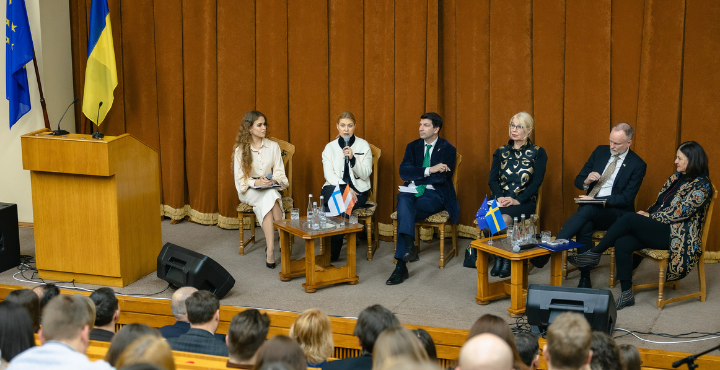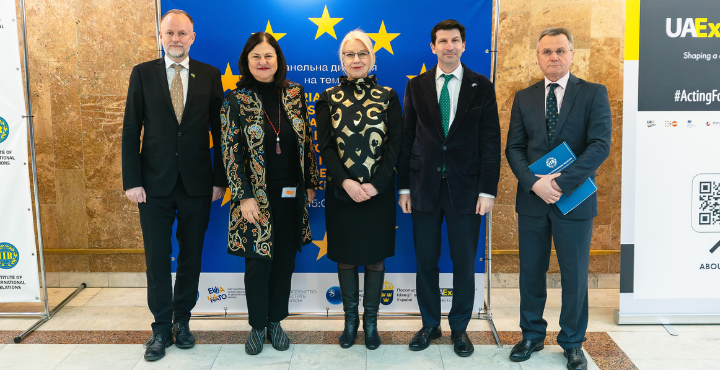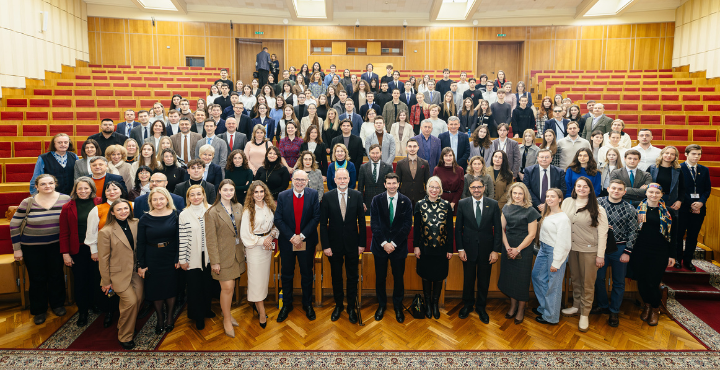Panel discussion «Austria, Finland and Sweden — Motivation and Challenges of Accession. Where are we now and what does it mean for Ukraine?»

On 12 February 2025, a panel discussion ‘Austria, Finland and Sweden - Motivation and Challenges of Accession. Where are we now and what does it mean for Ukraine?’ took place at IIR with the participation of Vice Prime Minister for European and Euro-Atlantic Integration of Ukraine Olha Stefanishyna, Ambassador Extraordinary and Plenipotentiary of the EU to Ukraine Kateryna Mathernova, Ambassador Extraordinary and Plenipotentiary of Austria to Ukraine Arad Benkö, Ambassador Extraordinary and Plenipotentiary of Finland to Ukraine Tarja Fernandes and Ambassador Extraordinary and Plenipotentiary of Sweden to Ukraine Martin Aberg.

The meeting began with a minute of silence for those who died in the Russian-Ukrainian war, followed by welcoming remarks by Valeriy Kopiyka, Director of the IIR, and Serhiy Nizhynsky, Head of the NGO ‘UA Experts’.
Arad Benkö started the discussion by giving a brief historical overview of Austria's path to EU membership. He noted that for more than 30 years Austria has been part of a large association and a powerful economy, which brings it significant advantages.
In her speech, Tarja Fernandes emphasised that one of the main reasons for Finland's accession to the EU was Russia. According to her, today's priority for Europe is security. Looking back at the events of 30 years ago, she stressed that Finland had made a conscious choice in favour of human rights and equality.
Martin Aberg noted that the main goal of Sweden's accession to the EU was economic growth. He also highlighted key lessons for Ukraine:
- economic benefits of joining the EU;
- the integration process takes a long time;
- it is important to be patient, but it is really worth it.
He concluded his speech by saying that Sweden is looking forward to another blue and yellow flag in the EU.

Kateryna Mathernova congratulated Sweden, Finland and Austria on their 30th anniversary in the European Union. She stressed that these countries are leaders in the field of gender equality and human rights in the EU. At the same time, she noted that Ukraine could make a significant contribution to the EU, particularly in the field of digital technologies. Despite some hesitations among member states, the Ambassador expressed confidence that with hard work, Ukraine will be able to join the EU.
Olga Stefanishyna stressed that, despite sceptical forecasts at the beginning of the full-scale invasion, the EU has supported Ukraine from the very first days. She stressed that our country is the new energy of Europe, an important security factor and a capable economic player. Olha Stefanyshyna also noted that Ukrainian youth play an important role in the European integration process, representing Ukraine in the international arena through educational exchanges, environmental projects, and other initiatives.
The event was co-organised by the Institute of International Relations of Taras Shevchenko National University of Kyiv, the Office of the Vice Prime Minister for European and Euro-Atlantic Integration, the Embassies of Austria, Finland and Sweden in Ukraine, and the NGO UA Experts.